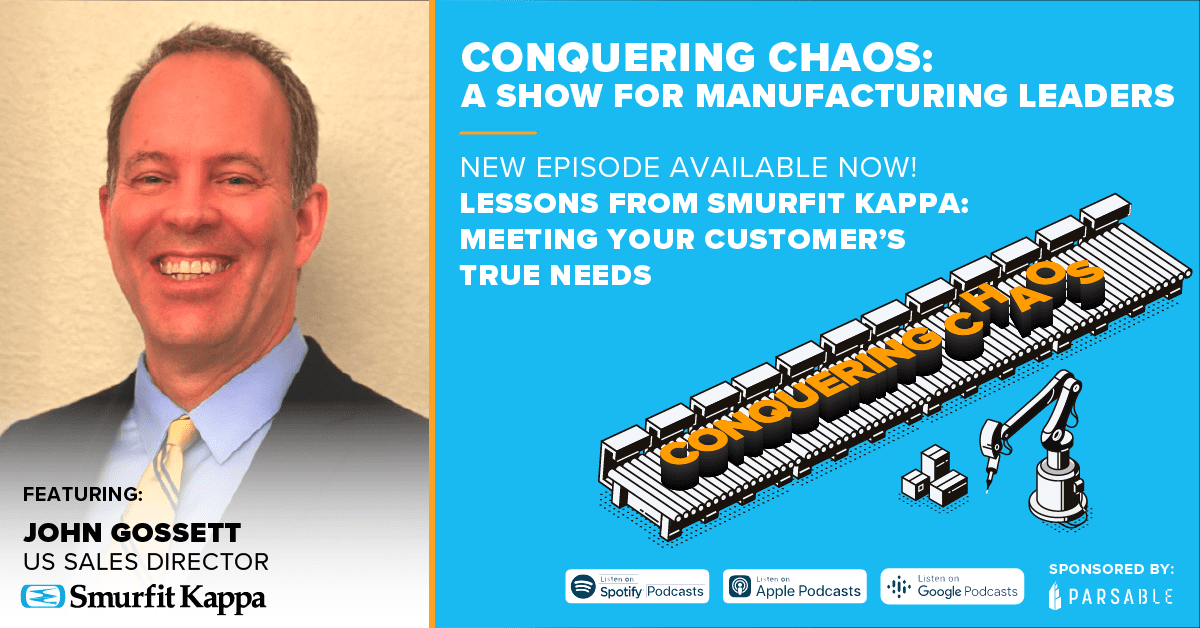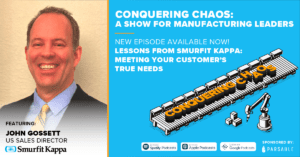Expert Insights from Smurfit Kappa US: Identifying and Meeting Your Customers’ True Needs

Expert Insights from Smurfit Kappa US: Identifying and Meeting Your Customers’ True Needs
Recently, Josh Santo, the host of Parsable’s “Conquering Chaos: A Show for Manufacturing Leaders,” spoke with John Gossett, U.S. Sales Director at Smurfit Kappa, a paper-based packaging solutions provider, about Smurfit Kappa’s culture of identifying and meeting their customers’ true needs.
Gossett has led teams at companies including International Paper and Georgia-Pacific. Today, John Gossett manages teams from Texas to California ensuring that they are providing the best solution for their customers. Most recently, he was named “Sales Manager of the Year” for 2020 and 2021, for his team’s achievements leading growth in new business for his companies.
In the podcast episode, Gossett explores lessons and insights gleaned from his work with Smurfit Kappa on ensuring teams are adopting a customer service mindset.

The Customer is Always — the Customer
Is the customer always right? Despite what most people believe, it’s not always about the customer being right. In fact, it’s a bit more intricate than that. By reframing the question from whether someone is right or wrong to instead working to sincerely understand the needs of the customer, you eliminate that question entirely. For a company to say that a customer is always right, means you are always telling them yes, despite not always being able to deliver on their expectations. Instead, companies should consider the idea of a “constructive no.” When the company says no it opens the door to a more proactive and effective solution because you have taken the time to analyze what is best for your customer.
Smurfit Kappa believes that if a company is always saying “yes” to the customer, they essentially open the situation to the customer being let down. It is far better to confront the difficult discussions up front, say no and then look for a solution that creates a win-win for all parties.
So rather than the old adage “the customer is always right,” the culture at Smurfit Kappa is built around the idea that the customer is always the customer. What the customer is right about is that they have a challenge that they need help conquering. Understanding this positions the relationship to have mutual understanding and establishes credibility on both sides, which ultimately keeps the customer a customer.
A Customer Service Mindset
Every member of a team impacts customer service. Even if their title does not explicitly say customer service, they are still in the business of servicing and satisfying customers. For example, in manufacturing, it does not matter that an employee is always working on an assembly line. That product goes from assembly line to shipping to the customer or the customer’s customer. Meaning the end customer is not just the purchaser of the product, it’s also coworkers, managers, suppliers and more. This means everyone throughout the business is positioned in a customer service role.
According to Gosset, “Each of us every day is working not just in our little block but in the entire world that involves all of our customers, both internal and external, as well as our partners…we’re constantly thinking about the fact we’re trying to deliver a good product or a service to our next customer.”
Customer’s True Needs
Gosset shared that it’s important to look for a customer’s true needs both internally and externally.
By developing a plan with the customer to enable a strategic partnership where everyone is happy is the only option. Understanding the root cause and why these partnerships will be beneficial enables the best service possible. It’s important that each stakeholder understands the benefits of the partnership and can enable this strategic partnership to thrive. In fact, this truly reinforces that ideal of constant customer service throughout all levels across the different types of customer.
“There’s numbers quoted that seven times more of your business comes from existing accounts,” Gosset said. “It’s that much harder to get new business to bring that business in.”
The same thing can be applied to recruitment and retention in a business understanding what your employees value, want and need — from sustainability goals to benefits and mentorship — has a major impact on employee retention. In the current workforce, it can be so difficult to retain employees, but by understanding and upholding what they truly want a business can maintain and grow their team, which is valuable because finding a replacement in this market is so difficult.
Conclusion
Smurfit Kappa believes that when creating a solution for a customer, it’s important to find one that generates long-term success. By ensuring everyone on the team has a customer service mindset the flow of work should flourish. Just like at Smurfit Kappa, leaders at all levels should keep in mind that the entire process is a partnership between every stakeholder at the company, because at the end of the day the company supports the customer and in turn the customer supports the company.
Want to learn more about operational excellence? Read more about the approach that encompasses all of the solutions you’ll need to maximize efficiency, improve worker safety and create a higher standard of production quality.







